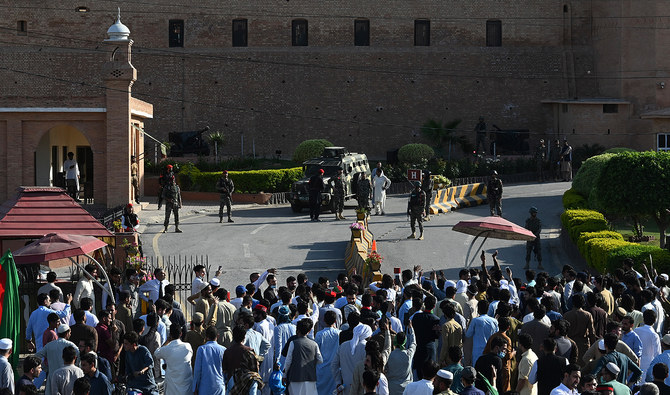ISLAMABAD: A special prosecutor of the Pakistan federal government said on Friday the army was “expected” to constitute military courts within two weeks to try suspects accused of attacking army installations during countrywide protests in the wake of the arrest of former Prime Minister Imran Khan last week.
The detention of Khan in a land fraud case on May 9 was met by days-long violent protests by his supporters, who torched cars and buildings, including military installations. Hundreds were arrested in the aftermath, with the army announcing that those found involved in the violence would be tried under relevant Pakistani laws, including the Pakistan Army Act.
The Pakistan Army Act of 1952 established military courts primarily to try members of the military or enemies of the state. Civilians accused of offenses such as waging war against the armed forces or law enforcement agencies, or attacking military installations or inciting mutiny, can be tried by military courts under a federal government order.
The army did not respond to calls and messages seeking comment for this story.
“Pakistan army is expected to constitute military courts under the army act in two weeks to try those involved in the riots,” Special Prosecutor Raja Rizwan Abbasi told Arab News on Friday, defending the trial of civilians by military courts under the Army and Official Secrets Acts.
“It is quite legal and lawful to institute the process,” the government lawyer said.
The Official Secrets Act prohibited attacks on, and the infringement and trespassing of, military installations, with those found guilt liable to be tried under the Army Act, Abbasi explained.
“Once the [military] courts are formed, the accused would have a fair chance to defend themselves to prove their innocence,” he said, adding that those convicted by military courts could appeal the judgment in an appeal court within the army, and subsequently also file “a writ petition in a high court after their mercy plea was rejected by the army chief.”
“If a convict thinks there was any malafide in the trial in military courts, he may file a writ petition in a high court,” Abbasi added.
He said the army would not need parliamentary or cabinet approval to form military courts as it was already empowered to do so under the Army Act.
“The army act empowers the military to constitute the courts and try civilians involved in abetment, planning and attacks on its installations,” he added.
Military courts operate under a separate system from the civilian legal system and are run by military officers. The judges are also military personnel and cases are tried at military installations. Trials are closed to outsiders, and no media presence is allowed.
The courts have faced widespread criticism from within Pakistan and rights organizations globally because of their secretive nature and their existence alongside a functioning civilian legal system.
“It is alarming to note that the Pakistani Army has stated its intention to try civilians under military laws, possibly in military courts. Trying civilians in military courts is contrary to international law,” Dinushika Dissanayake, Deputy Regional Director for South Asia at Amnesty International, said this week.
“This is purely an intimidation tactic, designed to crack down on dissent by exercising fear of an institution that has never been held to account for its overreach.”
The army has said in the past trials held at military courts are fair and guarantee human and legal rights.

















